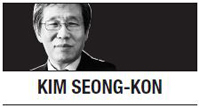
Parents’ Day is just around the corner in Korea. While browsing the internet recently, I came across some interesting articles on parenting. One of them said that young parents never seek advice from the parents who raised them. Perhaps young parents want to learn the most recent, a la mode child-rearing strategies, rather than the old-fashioned methods of their parents. Nevertheless, I was amused because it looked like children did not trust their own parents when it came to parenting.
Another intriguing article quoted the Talmud: “Parents must teach their children how to swim.” Initially, I was a bit confused. Why would they need to learn swimming? Soon, however, it occurred to me that perhaps what the Talmud meant was “You must teach survival skills to your children so they can prevail under any circumstances.”
Indeed, parenting in different cultures is intriguing. According to Jennifer Lansford, a professor of psychology at Duke University, American mothers respond to the baby’s needs, feeding or changing him or her when he or she cries. On the contrary, Japanese mothers try to anticipate the baby’s needs before he or she cries. Lansford points out that these different ways of parenting might affect the baby’s personality. That is to say, American mothers indirectly teach their baby to express his needs, whereas Japanese mothers and their babies become closely interdependent.
In the US, parents cannot leave their child unattended until he or she turns 12. That is why babysitters are needed when parents have a child under that age. In Korea, however, parents not only can leave children under 12 unattended but also can send them on errands without parental supervision.
Some time ago, newspaper reports said that a Korean judge couple were taken to the police station for leaving their baby unattended in a car parked at a supermarket in Guam. Obviously, they did not know that it was not allowed in American society and that, in the worst case scenario, their baby could be taken away by the authorities.
When I was in Russia a few years ago, I saw many mothers taking their children outside in strollers despite the freezing winter weather. At the time, I thought that Russian mothers’ intention was to make their children strong enough to endure cold weather. In Scandinavian countries, however, they say that mothers take their children out in strollers in order for them to get fresh air even in severely cold winter weather.
One of the articles I came across said that in Scandinavian countries a democratic relationship between parents and children is important. Accordingly, children’s rights are emphasized. It said “a child has the right to access their parents’ bodies for comfort, and therefore should be allowed into their parents’ bed with them in the middle of the night.”
The article also mentioned that sleeping in the same bed with a family member is common in some Asian countries. Interestingly, it stated, “Korean parents spend more time holding their babies and having physical contact than most. But within a family, obedience is key -- not democracy.”
Professor Sara Harkness from the University of Connecticut writes that American parents try to encourage their children’s abilities and talents so they can maximize their potential.
There is a compelling reason for this; American society has become increasingly competitive lately and parents worry that their children might fail in the competition. Korea, too, is a highly competitive society where parenting constantly revolves around academics and college admissions.
Harkness interviewed a Korean mother who played English tapes to her 2-month-old baby, arguing, “It’s never too early to start.” Harkness points out that in the Netherlands, parents tend not to push their children too much. She wrote, “Regularly scheduled rest, food and a pleasant environment are the top priorities for Dutch parents.”
In American society, parents would not allow their children to play loudly in public places. In Latin American countries, however, I saw children were freely running around, screaming and shouting at the airport lounge. In Latin American countries, where a warm social and interpersonal relationship is important, children seem to enjoy more freedom than their American counterparts. I also saw Latin American children enjoy interacting with their parents until late at night whereas American children usually are sent to bed around 9 p.m.
According to the article I read, American parents want to raise their children as “the happiest, the most successful, and the most well-adjusted leaders of the future.” They say that Japanese parents raise their children as someone who is independent and therefore not a burden to others. What about Korean parents?
If we raise our children as someone who wants to win in competitions at any cost, ruthlessly stepping on others, it would be very wrong. Although there is no “one and only” way to raise children, we should seriously ponder on whether our parenting is good enough.
By Kim Seong-kon
Kim Seong-kon is a professor emeritus of English at Seoul National University and distinguished visiting professor at George Washington University. He can be reached at sukim@snu.ac.kr –Ed.








